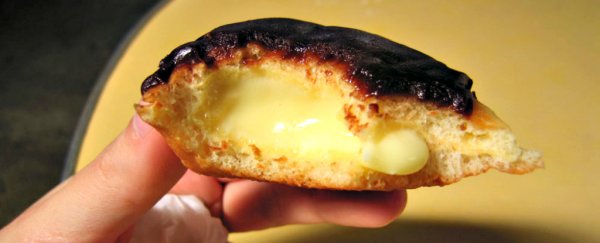Scientists in the UK have developed a supplement that can reportedly switch off cravings for high-calorie foods, such a pizza and doughnuts, while leaving the healthy appetite unaffected.
After testing the new supplement, called inulin-propionate ester, with 20 volunteers, they showed that it not only resulted in less cravings for junk food, it also made them eat smaller portions.
This is a small and very early trial, so we can't get too excited just yet. But the supplement, developed by researchers at Imperial College London, is based on a molecule produced by gut bacteria that tells the brain when you've eaten enough, and follows on from years of work into the feedback pathway.
The team had already shown that eating a type of fibre called inulin can increase the production of the molecule propionate in the intestine, which is made by gut bacteria when you're full, and signals to the brain to stop eating.
But they'd also shown that, by modifying inulin to contain propionate - a compound they've called inulin-propionate ester - they could trigger gut bacteria to produce as much as 2.5 times more propionate.
To test how that affects appetite, in this latest research, the team gave 20 volunteers either a milkshake containing 10 grams of inulin propionate ester, or regular inulin on its own, which acted as the control.
They then had them lie in an MRI scanner while they were shown various pictures of low or high calorie foods, such as salad and fish, or chocolate and cake.
The study showed that volunteers who'd drunk the inulin-propionate ester supplement had less activity in the reward regions of their brain - the caudate and the nucleus accumbens - than the control group, but only when they looked at the high-calorie foods.
These brain regions are linked to food cravings, so this suggests that the participants were craving the unhealthy choices less. This was backed up by the fact that the volunteers reported finding the high-calorie options less appealing, too.
In the second part of the study, the scientists gave the participants a bowl of pasta with tomato sauce and told them to eat as much as they liked. Those who'd drunk the inulin-propionate ester ate 10 percent less pasta than those who'd drunk inulin alone.
Bottom line, the results suggest that the supplement could not only help people crave less junk food, but also eat fewer calories.
"Our previous findings showed that people who ate this ingredient gained less weight - but we did not know why," said lead researcher Gary Frost. "This study is filling in a missing bit of the jigsaw - and shows that this supplement can decrease activity in brain areas associated with food reward at the same time as reducing the amount of food they eat."
The scientists also suggest that some people's gut bacteria might naturally produce more propionate than others, which could explain why some people find it so easy to stay slim, while others put on weight easily.
As we said before, this is a small study, so the scientists need to replicate their results and investigate the link between cravings and inulin-propionate ester further, but they're already looking into ways it could benefit society as a supplement.
"If we add this to foods it could reduce the urge to consume high calorie foods," said one of the researchers involved, Clair Byrne.
The findings have been published in The American Journal of Clinical Nutrition. You can find out more about the study below:
